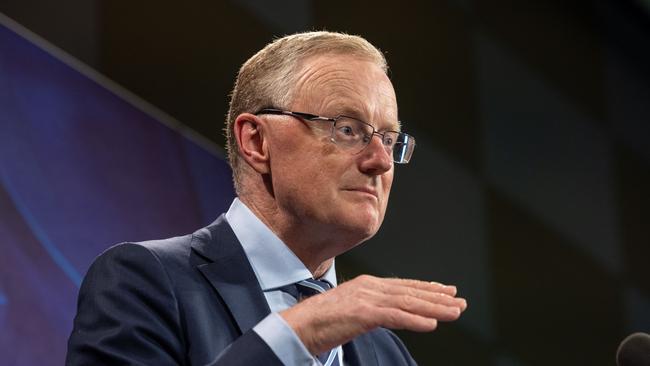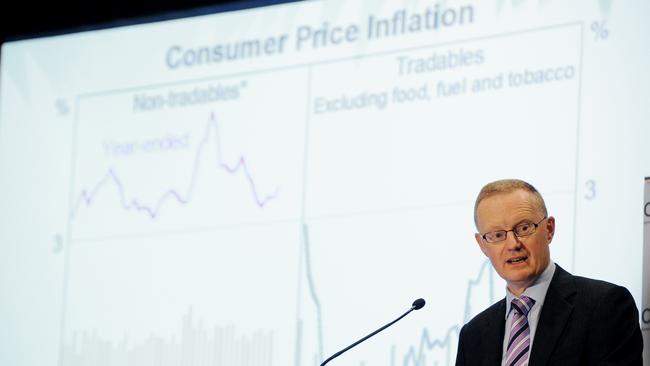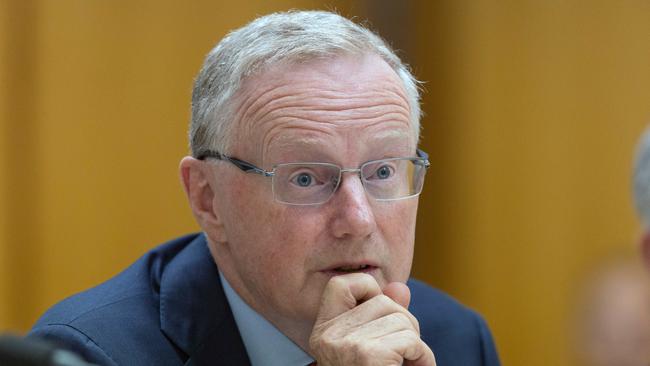RBA review: Is Philip Lowe’s long run as governor about to end?
No matter how much longer his 30-year tenure lasts at the RBA, Philip Lowe is determined to finish it with his head held high.

Reserve Bank governor Philip Lowe is determined to end his long career at the bank with his head held high.
Yes, he may have made mistakes in erring on the side of overstimulus in running monetary policy during the dark days of Covid, but – as he told a press conference on Thursday — he is not apologising for doing what he thought was the right thing to do at the time.
And, far from walking away from the top job when his term expires on September 17, he is ready, willing and able to head up a new look RBA and implement the changes of the 300 page report delivered to Treasurer Chalmers by a three-person review panel if asked to do so.
“It is a great honour and it is a great privilege to have the job that I have and I would also say it is a great responsibility,” he told the press conference, which followed a report that was critical of the bank’s handling of the Covid period.
“It is entirely up to the government whether I continue to serve in this role after September. If I was asked to continue, I would.
“If I’m not asked to continue, I will find another way to contribute to Australian society.”
While the chances of that happening are almost none — with the Treasurer, Jim Chalmers, expected to announce his pick for governor later in the year — Lowe’s insistence that he is not walking away from the job at the central bank he has been associated with since 1980, at least of his own volition, is his way of ending the job on his terms.
Faced with a report making some sharp criticisms of how the bank handled monetary policy during his seven-year term as governor, Lowe was determined to put things into perspective.
The reality is, as he said, all central banks around the world have been dealing with the same issues: how to handle monetary policy during Covid and how to handle the unexpectedly strong rebound in inflation as Covid receded.
He repeatedly insisted that he was not taking the criticisms of the bank personally.
“I am just one person on a board of nine and a staff of 1500,” he said. “I know with the board and with the staff, how dedicated we are to doing the right thing.
“We don’t always get it right, but we always try to do the right thing.
“I take comfort from the fact that the errors that we made are really clear in other countries as well.”
Before the pandemic, he said, inflation was low everywhere.
“Every country had a difficult period during the pandemic and responded really similarly with monetary policy and now every country has got high inflation.”
Talking with other central bank governors, he said, they were all dealing with the same issues.
Pressed about his decisions back in 2020 and 2021, when the RBA slashed interest rates, pumped money into the system giving a cumulative boost to nominal GDP of a massive $25bn over three years, and issued forward guidance that the bank might not raise rates until 2024, Lowe took journalists back to what it was like at Martin Place in those dark days.
“Our approach during the pandemic was to do every single thing we could do for Australia,” he said.
“We were facing dire circumstances. We were locked down. We wanted to do everything we could,” he said. “We didn’t want to leave any stone unturned.
“It turns out that we came out of it quicker than anyone expected and we had to wind things back. It turns out that we did too much.”
Lowe said he understood that some people had borrowed when interest rates were low and were now having to cope with having to repay their loans at higher rates.
But he was not walking back from the decisions made by the bank at the time made in the heat of the pandemic.
Despite the more than 50 recommendations for change and reform of the bank, Lowe downplayed suggestions that if a different framework was in place for setting monetary policy in Australia in recent years — including along the lines that the review recommended — that the real impact on the economy would have been much different.
“It’s not correct to say a different decision-making structure would make fundamental differences,” he said.
“We’re talking about improvements at the margin.”
If the recommendations had been implemented sooner, he said, they wouldn’t “fundamentally change how the economy works”.
“We’re not suddenly going to deliver 2.5 per cent inflation every year,” he said.
“It’s an improvement, but we’ve got to be realistic here.”
Lowe also pushed back at the review panel’s suggestions that the current Reserve Bank board – with six outsiders, largely from the business community — were easily steamrolled by Lowe and his fellow staffers at the bank into having their way when it came to monetary policy decisions.
Board members, he said, were “deeply engaged”.
“The idea that the board members sit there meekly and accept the recommendations that I put to them is very far from the reality that I have lived as the governor,” he said.
“In the boardroom right next door, what I see are nine people who are deeply engaged in the questions, who bring a great deal of expertise to the issues we are dealing with. They are probing, they challenge me, and sometimes I speak last in the meetings.
“That part of the review discussion didn’t really resonate with me,” he said diplomatically.
That said, he also agreed he could see why the review panel would want to see people with “more monetary policy and financial expertise” on the monetary policy board.
What Lowe did agree with was the need for a more formal governance structure at the bank, with more assistance for the governor at the operational level.


The review recommended the appointment of a chief operating officer of the bank and the separation of the current board into one board focusing solely on monetary policy and a second focusing solely on the governance of the bank.
Unlike some other central banks, the Reserve Bank also has responsibility for overseeing the payments system and the financial stability of the economy.
“There’s a lot more going on in this building than just monetary policy,” he said, indicating his support for proposals to put more structure around the operation of the bank and strengthen its governance processes.
Lowe also pointed out that the report had concluded that the bank had a strong reputation internationally and had “played an important role in the economic success that Australia has experienced over recent decades.”
He also reminded his audience that the panel had also reinforced the message that the bank should remain independent from government.
A mild-mannered Reserve Bank lifer, Phil Lowe has proved to be one of the most controversial heads of the Australian central bank.
As early as May last year he admitted that its guidance in 2021 that it was unlikely that rates would rise until 2024, was an “embarrassing” error, attributing the comments in consecutive monthly statements, to the bank’s concern about the potentially severe economic impact of Covid.
As the bank continued to raise rates, month by month, he has been forced to wear continued criticism for the bank’s bearish comments during the pandemic.
Earlier this year he also received criticism for attending a private lunch with investment bank Barrenjoey, after the Bank raised rates at its monthly board meeting, but before it released its latest statement on monetary policy.
Lowe, who has spent almost all his working life at the bank, has been linked with it since 1980 when he combined working with his university studies.
He did a Commerce Degree at the University of New South Wales, followed by a PhD in economics at the Massachusetts Institute of Technology in Boston which he finished in 1987 before returning to Sydney.
He worked his way up to the bank’s highest rank when he was appointed governor in 2016 by then Treasurer Scott Morrison, succeeding Glenn Stevens who had had a 10-year stint in the job, as did his predecessor Ian Macfarlane.

Lowe has become a convenient scapegoat for those who are dealing with the pain of rising interest rates, paving the way for the Albanese government to use the end of his term in September to make its own appointment to the top job at the bank.
In the normal course of events, the bank’s deputy governor is appointed to the top job, but Labor Treasurer Paul Keating broke the mould when he appointed Treasury Secretary, Bernie Fraser as governor in September 1989.
Despite the bank’s guidance on rates in 2021 there is strong support in the market for an extension of Lowe’s term.
There is also support for his deputy, another Reserve Bank veteran, Michele Bullock, to take on the role if Chalmers wants to make a change.
This would allow the bank to make the first appointment of a woman to the role – a move made possible by the unexpected departure early last year of deputy governor, Guy Debelle, who left to join Andrew Forrest’s green energy arm, Fortescue Future Industries.
Lowe’s comments set him apart from more hawkish central bank governors like the US Federal Reserve’s Jerome Powell, with a clear concern about the potential for rising unemployment and arguments that the Australian economy is different from others.
In his personal life, Lowe is a keen swimmer and cyclist and plays golf at his local club in Sydney’s eastern suburbs.
After a lifetime of service with the central bank, he may well have time for more of these pursuits later in September.







To join the conversation, please log in. Don't have an account? Register
Join the conversation, you are commenting as Logout